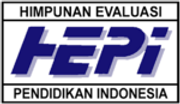The effectiveness of PAIKEM strategy in the curriculum of KTSP and 2013 for grade 4 students
Abstract
Keywords
Full Text:
PDFReferences
Hamalik, O. (2010). Kurikulum dan Pembelajaran. Jakarta: PT. Bumi Aksara.
Indrayati. (2017). The Implementation Of PAIKEM Based on Project-Based Learning and Cooperative Learning. IOSR Journal of Humanities and Social Science, 22(7), 37-43.
Kurniasih, I., & Berlian Sani. (2014). Implementasi Kurikulum 2013 (Konsep dan Penerapannya). Surabaya: Kata Pena.
Maslikhah. (2013). Melejitkan Kemahiran Menulis Karya Ilmiah Bagi Mahasiswa. Yogyakarta: Trustmedia.
Mulyasa. (2007). Kurikulum Tingkat Satuan Pendidikan: Sebuah Panduan Praktis. Bandung: PT Remaja Rosdakarya.
Nugraha, Purnamasari, I., & Tanuatmodjo, H. (2016). Interaction between the Type of School and Learning Outcomes in Student’s Soft Skills Enhancement through Cooperative Learning Model (Quasi Experiment on Vocational Students in Bandung). Procedia - Social and Behavioral Sciences, 219, 838-845.
Rahma, A., & Dezi Nur. (2013). Efektifitas Pembelajaran Matematika Pada Bab Perkalian Melalui Metode Jarimatika Terhadap Ketuntasan Belajar Siswa Kelas II MI Pabelan Kec.Pabelan Kab. Semarang Tahun Pelajaran 2012/2013 (PTK Kolaboratif). Salatiga: IAIN Salatiga.
Rusman. (2016). Pembelajaran Tematik Terpadu. Bandung: Fajar Interpratama Mandiri.
Sholeh, H. (2013). Pengembangan Kurikulum Baru. Bandung:Remaja Rosdakarya
Stefanidis, D., Anton, N. E., Howley, L. D., Bean, E., Yurco, A., Pimentel, M. E., & Davis, C. K. (2017). Effectiveness of a comprehensive mental skills curriculum in enhancing surgical performance: Results of a randomized controlled trial. American Journal of Surgery, 213(2), 318-324.
Suprijono, A. (2009). Cooperative learning teori & aplikasi PAIKEM. Yogyakarta:Pustaka Pelajar.
Suwardi, Anitah, W. S., Akhyar, M. & Asrowi. (2017). Gender Bias in Islamic Textbooks for Muslim Children in Indonesia. Attarbiyah: Journal of Islamic Culture and Education. 2(2). 214-235.
Suyadi. (2013). Libas Skripsi dalam 30 Hari. Jogjakarta: Diva Press.
Zainal, A. (2015). Model-Model, Media, dan Strategi Pembelajaran Kontekstual (Inovatif). Bandung: Penerbit Yrama Widya.
DOI: https://doi.org/10.18326/mdr.v10i2.245-268
Refbacks
- There are currently no refbacks.
Copyright (c) 2018 Peni Nur Hidayati

This work is licensed under a Creative Commons Attribution 4.0 International License.

This work is licensed under a Creative Commons Attribution 4.0 International License.
Program Studi Pendidikan Guru Madrasah Ibtidaiyah (PGMI)
Universitas Islam Negeri (UIN) Salatiga, Indonesia
Jl. Lingkar Salatiga Km. 2 Pulutan, Sidorejo, Kota Salatiga, Jawa Tengah 50716,
Telp. (0298) 323706 – Fax. (0298) 323433
Technical Support: jurnalmudarrisa@iainsalatiga.ac.id
P-ISSN: 2085-2061
E-ISSN: 2541-3457



